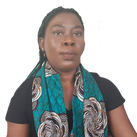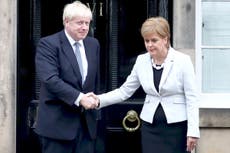Cancer or coronavirus? I survived one Big C but now I'm living in fear of another
I was in remission when the coronavirus hit Europe. I thought, I can't survive cancer and then end up dying of Covid-19. How would that look on my tombstone?


“Excuse me Mrs Meyer; dark skin is always difficult.” Like clockwork, the phlebotomist mouthed the standard German excuse for why she was going to keep sticking needles into my arm, in her persistent quest for blood.
I’d opened my mouth, ready to lecture her, when I caught sight of a small metal box with my name, and date of birth on it.
I was 36, freshly diagnosed with Herceptin-positive breast cancer. In the box was some radioactive substance to determine if the tumours in my chest had spread.
I decided to prioritise knowing how long I had left to live, rather than determining whether this lady was racist or not. I tapped the top of my palm, offering up the three veins that were always visible and ready to tap.
I officially became one of Germany’s annual 69,000 breast cancer cases on 4 December 2018, but I had known at least two years earlier.
In 2016, my then-gynaecologist gave me some medication to reduce fibroids that resulted in hair growth on one nipple. I immediately stopped the medication and had a hysterectomy, hoping to rule out fibroids forever.
Weeks later, I stepped out of the shower and was saved by a gnarly knob of shea butter. As I vigorously rubbed the butter into my chest to melt it, I realised the area was uneven, raised. Two years of haggling began with this gynaecologist. Initially, after an ultrasound he said they were cysts. Then they said the lumps were just tissue, since I was not a very fleshy woman. Finally, they were likely caused by “too much weight-lifting.”
I stopped lifting weights and tried to get on with life.
One day, after walking up a few stairs, I collapsed. I was no longer the person who ran half-marathons. As the lumps began to harden, so did my resolve. I began to fight my gynaecologist for a mammogram.
Finally, on 13 November 2018, I watched a technician cram my breasts into something that looked like a photocopy machine.
As I began laughing, she asked: “Is this your first mammogram?”
I nodded, giggling as the cold surfaces made my nipples harden.
“Ich drücke die Daumen für Sie,” she said, burying her thumbs in the centre of her palms. For good luck, on my behalf.
Actual luck came after chemotherapy: on 24 July 2019 I was declared in remission. There was no spread to my lymph nodes, and the six months of chemotherapy was 100 per cent successful – which is not the case for everybody. Germany may have misdiagnosed me, but Germany had also saved me.
I was to continue taking Herceptin infusions for a year. Every three weeks, on Tuesdays, I joined other patients in recliners, listening to the radio. Baby Jane by Rod Stewart. West End Girls by the Pet Shop Boys. Close to You by Maxi Priest.
Then along came Covid-19. By the time the coronavirus had begun ravaging Europe, our small talk had shifted from comparing our white-blood cell counts to this new disease. We traded expert stories on what it could mean for us: none of it was good. The mood was particularly subdued on 10 March 2020, as we listened to a news bulletin saying Italy had announced a lockdown.
Cancer had already somewhat prepared me; medical grade face masks, gloves and frequent hand washing were the main reason why I did not catch the flu or any communicable infections throughout chemotherapy. What I couldn’t understand was why the rest of the world, including my husband, was not taking this seriously.
“I cannot survive cancer and then end up dying of Covid-19. How would that look on my tombstone?” I’d yell at my husband, before ordering him to wear a mask, gloves and walk around with sanitisers and bleach.
Long before hospitals restricted visitors, I enforced online-only grocery shopping. No item entered our house unless it was sprayed and wiped down with bleach. We wore gloves and masks even to take out the rubbish.
I also wondered why the government was dilly-dallying such that by the time a lockdown was announced in Germany on March 22, I had already made the decision to cancel my last Herceptin infusion. I also had other worries; my pre-cancer stash of face masks and gloves was running low, and now officially a scarce commodity worldwide. Like my country, I’ve also had to source cheaper face masks and hand gloves from China.
Breast cancer is the most common cancer, affecting 2.1 million women annually and causing the greatest number of cancer-related deaths, so there are days I feel closer to a statistic than a survivor. Now, I fear the other “Big C”: Covid-19. Every cough, every unmasked face in the street sends me literally running for my life.
I cannot come to terms with the fact that I may have survived a terminal disease, but could end up killed by a communicable one.
This peculiar irony is why I say for cancer patients, there is no post-Covid reality. So long as this virus and irresponsible people exist, so will our fears for our fragile mortality.
Ruona Meyer is an Emmy-nominated multimedia journalist with 17 years’ experience across Nigeria, South Africa, the UK and Germany, where she lives with her family.





Join our commenting forum
Join thought-provoking conversations, follow other Independent readers and see their replies